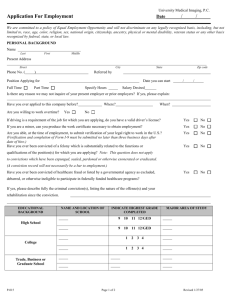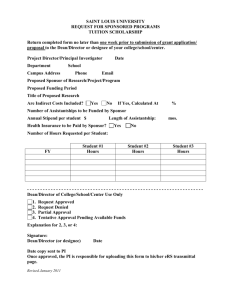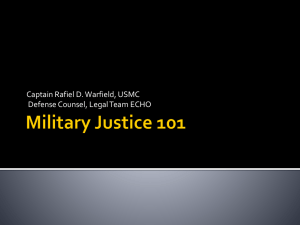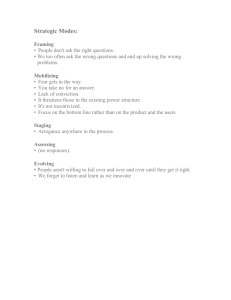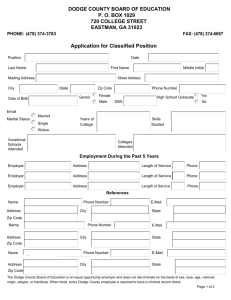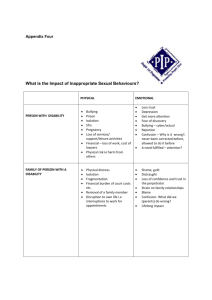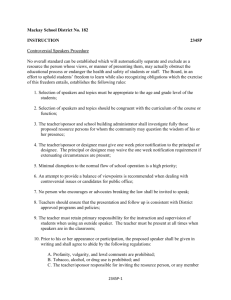HR Criminal Drug Offense Reporting
advertisement
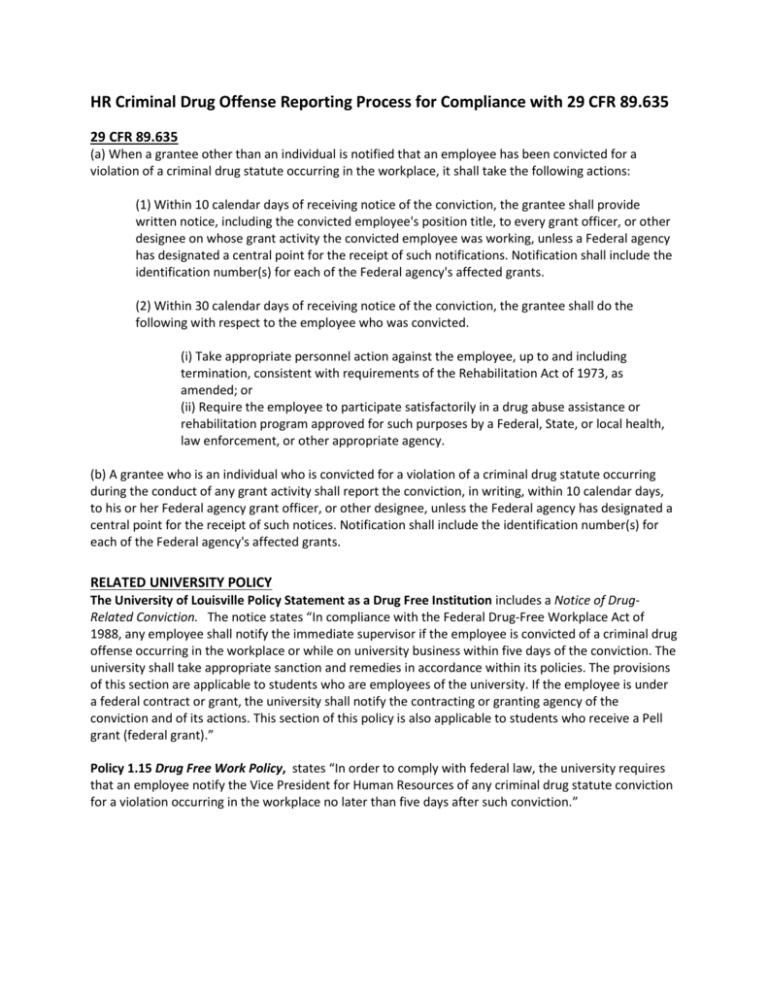
HR Criminal Drug Offense Reporting Process for Compliance with 29 CFR 89.635 29 CFR 89.635 (a) When a grantee other than an individual is notified that an employee has been convicted for a violation of a criminal drug statute occurring in the workplace, it shall take the following actions: (1) Within 10 calendar days of receiving notice of the conviction, the grantee shall provide written notice, including the convicted employee's position title, to every grant officer, or other designee on whose grant activity the convicted employee was working, unless a Federal agency has designated a central point for the receipt of such notifications. Notification shall include the identification number(s) for each of the Federal agency's affected grants. (2) Within 30 calendar days of receiving notice of the conviction, the grantee shall do the following with respect to the employee who was convicted. (i) Take appropriate personnel action against the employee, up to and including termination, consistent with requirements of the Rehabilitation Act of 1973, as amended; or (ii) Require the employee to participate satisfactorily in a drug abuse assistance or rehabilitation program approved for such purposes by a Federal, State, or local health, law enforcement, or other appropriate agency. (b) A grantee who is an individual who is convicted for a violation of a criminal drug statute occurring during the conduct of any grant activity shall report the conviction, in writing, within 10 calendar days, to his or her Federal agency grant officer, or other designee, unless the Federal agency has designated a central point for the receipt of such notices. Notification shall include the identification number(s) for each of the Federal agency's affected grants. RELATED UNIVERSITY POLICY The University of Louisville Policy Statement as a Drug Free Institution includes a Notice of DrugRelated Conviction. The notice states “In compliance with the Federal Drug-Free Workplace Act of 1988, any employee shall notify the immediate supervisor if the employee is convicted of a criminal drug offense occurring in the workplace or while on university business within five days of the conviction. The university shall take appropriate sanction and remedies in accordance within its policies. The provisions of this section are applicable to students who are employees of the university. If the employee is under a federal contract or grant, the university shall notify the contracting or granting agency of the conviction and of its actions. This section of this policy is also applicable to students who receive a Pell grant (federal grant).” Policy 1.15 Drug Free Work Policy, states “In order to comply with federal law, the university requires that an employee notify the Vice President for Human Resources of any criminal drug statute conviction for a violation occurring in the workplace no later than five days after such conviction.” PROCEDURES I. There are three methods of notification for criminal drug convictions: A) A sanction check conducted by the Associate Compliance Officer in the Institutional Compliance Office (ICO) or by an Employment Representative in Human Resources; B) A position transfer CBC indicates a drug conviction (Pertains to those currently working at UofL hired into a position that requires a background check when coming into the dept., such as but not limited to Pediatrics or DPS.) ; or C) A drug conviction is self reported to Human Resources. Self-reports should be directed to the Director of Affirmative Action/Employee Relations. II. When a violation of a criminal drug statute occurs in the workplace, the Director Affirmative Action/Employee Relations or designee contacts the convicted employee’s department to determine if the position is sponsor funded. A) If not sponsor funded, 29 CFR 98.635 does not apply. B) If sponsor funded, the Director of Affirmative Action/Employee Relations or designee along with the Director of Grants Management or designee and the Director of Industry Contracts or designee determine whether current employee drug conviction is applicable for reporting to sponsor. C) If not applicable for reporting, the process ends. D) If applicable for reporting to sponsor, the Director of Grants Management or designee or the Director of Industry Contracts or designee (dependent upon which office handled the sponsored project) report employee’s drug conviction to sponsor per 29 CFR 89.635. In cases of suspected drug conviction reported to Human Resources or brought to attention by reports in the media, the Affirmative Action/Employee Relations department investigates. If the drug conviction is substantiated, the Director of Affirmative Action/Employee Relations contacts the employee’s department to determine if the position is sponsor funded. If sponsor funded, the procedures for notification for criminal drug convictions apply. (See flowchart below) ICO/HR sanction check Position transfer CBC indicates drug conviction Drug conviction is self reported to HR Drug conviction is suspected and reported to HR or reported by media Drug conviction was in the workplace HR contacts department to determine if position is sponsor funded Yes, sponsor funded Determination between HR and Grants Mgmt/ Industry Contracts whether current employee drug conviction is applicable for reporting to sponsor Applicable for reporting Not applicable for reporting Grants Management/ Industry Contracts reports employee’s drug conviction to sponsor per 29 CFR 89.635 Not sponsor funded (STOP) Affirmative Action/ Employee Relations investigates Drug conviction is substantiated Drug conviction is not substantiated (STOP)
